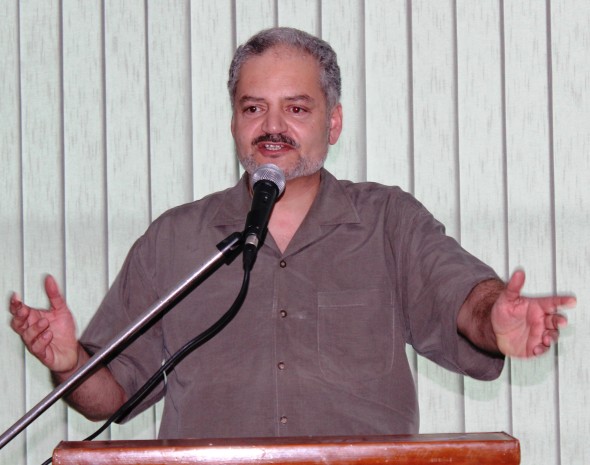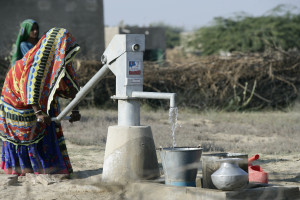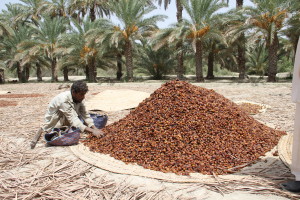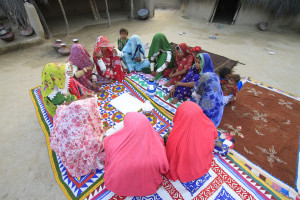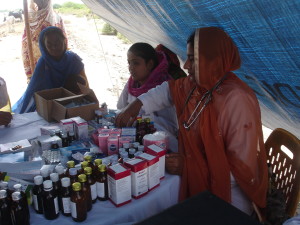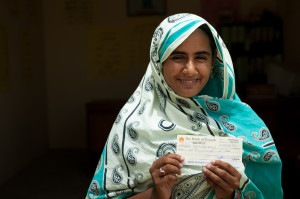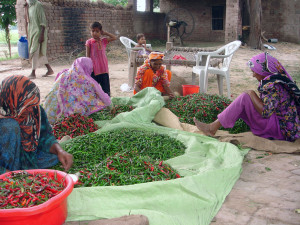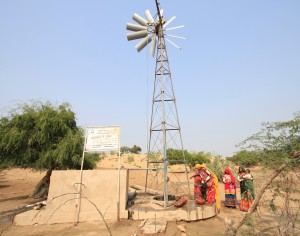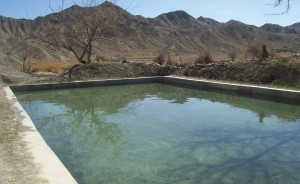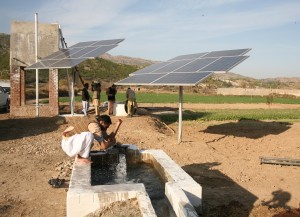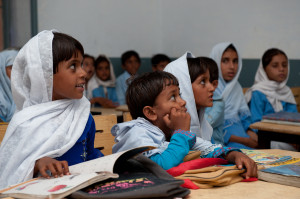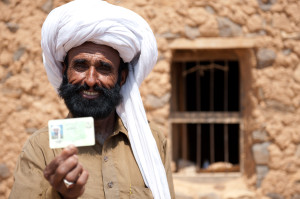Operating for over a decade in Pakistan, Pakistan Poverty Alleviation Fund (PPAF) remains committed to lifting Pakistan’s destitute out of poverty. Through years of continuous outreach and engagement, PPAF has successfully implemented projects to meet the specific needs of the poorest groups of society in the fields of livelihood enhancement, skills development, microcredit, water & energy, disaster relief, infrastructure, health, education and employment generation. In spite of formidable challenges, PPAF’s reputation of excellence and integrity has always remained at the forefront of its diverse work. CEO PPAF, Qazi Azmat Isa talks to Mashaal Gauhar and Shafaq Khan about PPAF’s new innovations, the need to ensure greater participation of women, the transformative impact of PPAF’s work and about upholding the true spirit of development. Qazi Azmat Isa is deeply committed to improving the lives of poor and marginalised. With over 25 years of experience in development, he has adopted a rigorous approach to poverty alleviation underscored by maintaining close links with the people PPAF serves. His wealth of experience in working with deprived communities has given him keen insight into how to effectively enable and empower people mired in poverty. He has served on several boards in a voluntary capacity, including as Chairman of the Society for the Protection of Child Rights (SPARC), Board Member with the World Wide Fund for Nature (WWF), LEAD and is the current President of Aurat Foundation.
PPAF has been selected to design, mobilise, implement and monitor the Prime Minister’s Interest Free Loan (IFL) scheme to support micro enterprise activities, can you elaborate on PPAF’s strategy in deploying loans across Pakistan?
Qazi Azmat Isa: “Poverty is not a homogenous phenomenon: there are the entrepreneurial poor, the destitute and the extreme poor. Now that Pakistan has a poverty scorecard, it’s very easy to identify these various groups based on the scorecard. Within the scorecard, 23 is the cutoff line that the government has established as the poverty line so anyone below 23 is poor and anyone over 23 is a little better off. Now that we have this universally accepted instrument, it is easier to target our interventions. For the destitute or the extremely poor we do asset transfers such as grants and we provide public goods including health, water and education. For the entrepreneurial poor who know the markets and have a skill but don’t have the financial resources because they don’t have access to commercial banks, for them we have the microfinance sector.
PPAF is very strategic in terms of how it leverages its resources. The IFL scheme came to us as a nice fit as there was an empty space between the measures of the 18 mark with the destitute poor and the 30 mark with people who can’t take loans because they can’t pay back debt, so the IFL scheme came at a very opportune time. This scheme is specially targeted at people slightly above the extreme poor, but below the entrepreneurial poor. It will also be targeted spatially at those areas where there is very little or no micro financial activity. Pakistan currently ha approximately 3 million microfinance clients which is just the tip of the iceberg, so there is a huge unserved market so we are very conscious of the market – it was mandatory for all our partners to use the poverty scorecard to make sure that the scheme is availed by those for whom it is intended.
Aside from the poverty scorecard, we also use a spatial dimension measure to make sure that if there is a particular district or union council that has at least 10% of microcredit coverage then we ensure that we don’t go there. For example, areas like Balochistan with approximately 32 districts, probably other than four, all of those will qualify. Places in Southern Punjab, FATA, Khyber Pakhtunkhwa (KP) and South Sindh – these are the primary areas where this scheme will be taken. It is important to mention here that PPAF doesn’t just give out money: we build an eco-system around that and this has also been a vital element of our success strategy. If you look at how microfinance has progressed in Pakistan, with 60 institutions, three million borrowers, and Pakistan now ranked the third best in the world by The Economist for two years running because we created the eco-system, be it being wholesalers or building capacity and institutions that have transparent systems that know how to do the work. Similarly for the IFL scheme, even though the loan size we envisage will be around Rs 25,000, which is a small amount compared to some of the other schemes that are on offer, we are very conscious of that fact that even that money is utilised efficiently and gives people returns so that they are able to complete a few cycles of these interest free loans and then have access to commercial funding. That is how you graduate people out of poverty rather than constantly giving handouts. Once we have the resources we can then implement these eco-systems.
We have institutions called karobari shifa khanas which tell people how to productively use these loans and how to make cash-flow cycles. Our approach to poverty alleviation is to build institutions for the poor so that they can take decisions and have control over their lives.”
PPAF has attracted praise for strengthening microfinance in Pakistan, how was this achieved?
QAI: “I always say that there are no magic bullets and there is no alternative to hard work. As Malcolm Gladwell mentions is his book Outliers: The Story of Success, that all the greatest achievers, be it Steve Jobs or Bill Gates, have to put in the 10,000 hours. There is a bit of inspiration and 99% is perspiration, and I think this is true for everything in life. You just have to keep at it and what holds you in good stead is that you have good values that give you inspiration. PPAF is about inclusion and about empowering people and that can be a slow and tedious process, but constant vigilance can get you there in the end. For instance, in Pakistan we do poorly on gender. This was highlighted in a recent report that ranked 136 countries in the world on gender and Pakistan was sadly 135th. I’m hoping that those statistics were from a few years ago and that there will be an improvement now because we are increasingly putting women at the heart of whatever we do, be it microfinance or infrastructure.
Our women borrowers are now at 77% as some of our partners work exclusively with women which has brought up the numbers. I feel that every institution should make sure that at least 50% of their clients are women. However, you still have to dig deeper and see whether these women are truly empowered; do they have control over their loan? So we never rest because there is much more to be done if people are to be truly empowered, that they have a voice, as that is what development is truly about and microfinance is just one good instrument in achieving that.
Pakistan is so heterogeneous and incredibly large. For example, between Gilgit to Gwadar, everything from the topography, language, culture and climate changes. At PPAF, with our 126 partner organisations working in 121 districts and a network of over 122,000 grassroots community organisations, we will never impose a model which compromises our values in any way. Wherever we are working, we ensure the inclusion of women, of the disabled, the extreme poor – these are our key principles that ground us and are at the heart of our work. The other values we have include: good governance, transparency, sustainability and participation. Increasingly, we also realise that in a country racked with violence and conflict, we are now starting a programme about peace and conflict resolution because before you do development you have to sit down and talk to each other. Healing societies should be at the heart of development work because you cannot achieve anything until people respect each other.
We cannot label minorities and make them second class citizens: everyone should be equally respected because we all make up the colourful mosaic of Pakistan and add to it in our own individual ways. We need to treasure and value that. Increasingly, our programmes are now going to have mainstream curriculums with a focus on social mobilisation and institutional development – so not only telling communities how to open bank accounts but also how to implement conflict resolution.”
Last year, PPAF introduced the first-ever indexed and hybrid weather micro-insurance products to facilitate and compensate small farmers in Pakistan, what has been the response so far?
QAI: “Three years ago we made the strategic shift after being satisfied that the basics had been done right. We acknowledged that the client needed more than the basic vanilla loans so there has been a lot more emphasis on micro-savings, micro- insurance and even within insurance we have tried innovating. We have 25 different products and one of these is unique in the world which makes us trend setters as Pakistanis for which we sometimes don’t give ourselves due credit.
After 12 years now, PPAF stands at a place where there is recognition for our work and credibility. The next thing we want to bring to the table is scale. We are trying to create platforms to bring in people with similar and values as us and we will bring in our level of skills and competence. As we are a non-profit organisation we don’t solely focus on high returns for our ventures so we like to invest our resources into being creative, designing new products and disaster relief. For this particular project, we brought in insurance experts, the Pakistan Meteorological Department, the livestock department, two private insurance companies, and the Securities and Exchange Commission of Pakistan. These were the kinds of stakeholders that we had brought together for this project. Weather-based insurance had been implemented successfully in India so we funded a trip for all these stakeholders to go to India and learn everything about it. On their return, they gathered all of their data and designed the product. Similarly, the livestock project is of immense value to the poor because their livestock is their safety net. Since they do not own land the livestock is their sole asset. So a typical insurance product would be, for example, to insure a goat for between Rs 3000 to Rs 5000 and if the goat dies then that amount would be received. However, the investment that had taken place over the months in terms of the weight gain and waiting for the calf to become an adult and sell it in the market, there was no account for that. Consequently, we designed weight-based insurance so every month the goat would be weighed and the weight would be given a numeric value. Therefore, if a calf were to die after a few months, the return would not just be the insured amount, but the incremental value added that the farmer had invested into the animal. This has proven to be quite successful and like everything else at PPAF, we always start small with every new project we do: we test out a pilot first, we get our hands dirty, we iron out the rough spots, we define the process, we ensure that we know what were are doing and then we scale gradually. We started this in one district of Peshawar and now we have taken it to four districts. Inshallah we will take it across the country and that will be a really significant benefit for poor farmers. So PPAF is now at a platform where it is taking off in all kinds of directions and we are increasingly having many more collaborations, not only with civil society but also increasingly with the government.
I find the start of 2014 very hopeful because there are four different provincial governments and that is a good sign because everyone wants to contribute. We intend to work closely with KP and Baluchistan where there is a lot of violence and people feel deprived because even after 60 years they don’t have a stake in the federation so that is also a part of PPAF’s mandate: that even though the government is not delivering on education in a certain place, and since PPAF is government sponsored, we make sure that wherever we go, our partners give credit to the government.”
PPAF’s renewable energy project for Pakistan’s marginalised communities has attracted much interest, what are your views on Pakistan’s energy crisis?
QAI: “In my opinion, like with most things, the solutions have been well known. It’s not rocket science, but requires the basic political will to ensure accountability and good governance where institutions are not delivering. Issues like non-payment of bills, circular debt – all these things can be resolved. I’m not saying it is going to be easy because we’ve been accumulating these institutional bad practices over decades and we have a hemorrhaging of over Rs 5 billion a year. Imagine if this amount was used for development or education – these issues are holding this country hostage and something needs to be done about it. The other set of issues revolves around how we actually generate our energy. In Pakistan this process is very lopsided and focuses on two energy sources: hydro and thermal. Other countries have significant amounts of energy from coal so there has to be a good balance between the four components of energy sources which are coal, hydro, thermal and fuel. Pakistan is heavily dependent only on two sources so we need to bring in diversity and also add in a lot of renewables especially with places that are off the grid. The off the grid solutions have a lot potential and this is a wonderful way to link up communities because life transforms when you bring in a light to a village, especially in areas where dusk is at 5 pm.
PPAF has a grant-based programme which is looking at this as a public good. We have set up public utilities especially micro-hydels. We have implemented hundreds of these in the north and have seen the benefits of it. We have completed 30,000 infrastructure schemes, including several hundred energy schemes which are based on the needs of the communities. If energy is one of their needs, we will provide them with grants up to maximum 90% because even if that community is really poor we still require at least 10% contribution and that can be in the form of labour or anything else, as long as they can maintain some sense of ownership. The community is then taught how to properly maintain the micro-hydels and whoever is running the micro-hydel charges the community whatever is required to ensure that if the generator breaks down then there are sufficient resources available to get the problem fixed. So, increasingly there is the public goods side of it. We are also looking at utilities where one community may be producing energy which is surplus to their requirement, they can pass it on to other villages as well. Now that the Chinese have entered the market, costs have reduced significantly, especially for solar energy products.
Recently, there was a film produced by the CNN that covered some of our work in Southern Punjab. Our philosophy is about social empowerment and transformation. These are the kind of win-win situations that we need to create instead of just being hung up on statistics. Also, as practitioners and community developers we need to constantly question what we do and what sort of effects our work could have, both negative and positive, as the devil is in the detail. Empowerment for us is not just a word but translates into action. For example, all the women PPAF works with need to have identity cards. In some of the rural areas we work in, very few women have identity cards and without that you don’t have an identity: you can’t open a bank account or vote, so this we have declared as absolutely necessary. People can now access the markets, they can hold the government accountable, they have a voice and they can choose their leaders through a ballot system rather than a show of hands.”
You are on the board of the Finance Minister’s newly constituted economic advisory council, what are your views on Pakistan’s current economic state?
QAI: “It is a real privilege to be on the council and I am grateful to be there – I take this as recognition of the work that PPAF has done. We had our first meeting recently where the Finance Minister briefed us on the current state of the economy and the challenges that we face. He called them the three ‘Es’: energy, economy and extremism. Energy is a big priority for the government; the other is obviously growth and making sure that our fiscal position is in check, getting funding to donors on time and the IMF package etc.
I believe that all people must have the right intention and attitude – we can’t really determine the outcome, we can only try and do right by the people despite the hardships. It’s not about me, it’s all for a higher purpose and the government has the right intention so far: they want to be inclusive, especially where energy is concerned as that is their main priority. We will also contribute with our renewables. We have a specific project funded by the Germans on renewable energy in KP and that is also doing very well.
Once you actually visit the field, you get to see what development is all about, interacting with the people, seeing the micro-hydels, seeing how the people are dealing with the energy crisis through these renewables and there the penny will really drop in many ways. That is what puts the fire in the belly and if you look at what PPAF really about, it’s a virtuous circle that is lead by ishq and without ishq you cannot do anything. If you stay in Islamabad for too long, that fire diminishes. The fire is out there in the field and you have to keep renewing it. The second thing is ilm, which is to constantly renew your knowledge and stay relevant to the lives of people; the third is amal because without amal or action, both the ishq and the ilm are irrelevant – so it’s a virtuous cycle and how you ensure this virtuous cycle is by staying close to those you serve. The closer you are to those you serve, the more ishq and ilm you have and the more charged you are to do the amal as well.
To give an example of how we achieve this, we have our regular monitoring and appraisal visits, but we have also instituted what we call immersion, which means that all our employees have to spend two nights in a village, everyone from the CEO down to the management executives, and we tell them that this a fully paid holiday but the goal is to walk in the shoes of the people, live their lives, know their hopes, fears and dreams. The team has often come back with photographs and I like to see them have their photographs of the families they have spent time with on their desks so that they can say that their work is directly related to these people and that they are trying to make a difference in their lives. Development often becomes about numbers and statistics and it loses that personal, human element so this is a way of incorporating that back into the process – stay relevant to the people and help and assist them to the best of our abilities. I always pray to God that let our work be linked to something that can actually do some serious good.”
What is your vision for the future of PPAF?
QAI: “I think the future is very exciting for PPAF. We have proven ourselves over the past 12 years and now we are developing a vision for 2020 which will be ready soon. There are some key elements in this plan and as we are a national institution, we are being contacted by countries like South Africa who want to implement similar strategies within their development work and want us to help them set up. We are also thinking of bringing in the diaspora, making them play a bigger role and creating a platform where people can support a child, a school or a village and contribute whatever they want. PPAF is now an endowment so you will be able to see how your contribution is making a difference. The aim is to engage more people into having a stake in the country and widen PPAF’s ownership in that sense. We are also focusing much more on partnerships with academia. UCL, LSE, Yale for example, are doing our impact evaluations, and even our local blue chip academic institutions like IBA, LUMS, LSE (Lahore) are doing our monitoring and evaluations so that it has a lot more credibility. These partnerships help us to uphold the ethos of keeping knowledge at the heart of our work and constantly improving what we do.
Another dimension for the future is taking microfinance to the next level so even though we can say that after 12 years we have got the basics right, there is still room for improvement. For example, introducing new tools like the Credit Information Bureau through which we have made it mandatory for any partner institution that gives a loan to anyone to check how many loans that person already has so that people are not over-indebted. We are also looking to increase our scale: going from the three million and gearing towards a five million figure. We have the institutions, the regulations, the apex – we just need the resources. We also had an international microfinance summit for the first time in Pakistan last year, which was inaugurated by the Finance Minister.
Livelihood is a also a new element we are introducing through our group called Livelihood Enterprise and Employment Development which is implementing the IFL scheme as well. Overall, there is huge potential, whether it is the youth scheme of the Prime Minister, be it creating the eco-system or the microfinance sector so that it is not only about providing the resources but also capacities, knowledge of the market, creating karobari shifa khanas. I have inaugurated a centre for all the women who have lost their jobs sewing footballs in Sialkot as China now has captured this market with their competitive prices.
We also want to keep strengthening partner institutions and community institutions as well as build peace and restore hope in the country – because if this country succeeds we all succeed.”



